Go Lean Commentary
This is the goal of business decision-making … everywhere:
Choose the options that provide the most benefits with the least cost.
To accomplish this goal there is the need to employ the Comparative Analysis tactic; this was thoroughly defined in the 2013 book Go Lean … Caribbean; see here from Page 119:
Compare and Analyze Opportunity Costs
The comparative analysis conundrum is straight forward: an absolute trade advantage exists when countries can produce a commodity with less cost per unit than could its trading partner. By the same reasoning, it should import commodities in which it has an absolute disadvantage. For businesses, this is essential to remaining competitive.
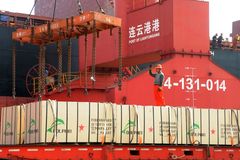 When we combine the Theory of Comparative Analysis and Cross-Border Trade, we many times get to a situation of Zero Sum Thinking, that is, there will be winners and losers.
When we combine the Theory of Comparative Analysis and Cross-Border Trade, we many times get to a situation of Zero Sum Thinking, that is, there will be winners and losers.
But …
… when we approach the same scenario with Non-Zero-Sum Thinking , then we realize that we could have “win-win” … in the long-run. The Theory of Comparative Analysis allows for an international trade practice where producers can specialize in different roles in production and the supply vertical – the end result being “net gains in total output”.
So the country providing cheap labor can elevate their economy with more specialized labor and an elevation to the Middle Classes, thus becoming consumers, themselves, of the end-products of the production web. This is what happened in China … and “Asian Tiger” countries, lifting their Middle Classes from poverty in a short time. This was related in a previous Go Lean blog-commentary from June 20, 2019; see this excerpt:
‘Free Market’ Versus … China – Two Systems at Play
China elevated itself from poverty to prosperity for 1.3 Billion people in just 40 years. Well done. See VIDEO here:
VIDEO – How China became the world’s second largest economy – https://youtu.be/_sV5P_F3frYCNN Business
Published on Oct 6, 2015 – More than 500 million people have been lifted out of poverty since China’s economic reforms began in 1978.
- Category: News & Politics
Just think of all the Chinese made products that you have enjoyed; i.e. Apple’s iPhones, Nike’s Sneakers, etc..
This “Non-Zero-Sum Win-Win” happens … eventually, but usually only after Long Train of Abuses. This is why this discussion is so important. Many times Global Trade is pursued only for the short-term gain of maximum benefit at minimum cost; we have observed-and-reported on this in Detroit, Michigan. But we have found, that if the motives are for everyone to benefit – the elusive win-win – then the misery could be avoided in the first place.
Some times that misery spurs hate, disgust, terrorism and even war.
This is the continuation of the February 2021 Teaching Series for the movement behind the 2013 book Go Lean…Caribbean. For this month, we are looking at the psychology and sociology of Zero Sum Thinking and trying to identify, qualify and correct the defects that it brings to Caribbean society. This second entry, 2-of-6, asserts that the problem for the Caribbean is bigger than just the Caribbean. The problem with Globalism is it affects the whole globe. Consider the full catalog of this series, has it is being presented:
- Zero Sum: Lesson 101 – No more “Gold Standard”
- Zero Sum: Realities of Globalism – “Non-Zero Sum” for the whole world
- Zero Sum: ICT as a tool, the “Great Equalizer”
- Zero Sum: Regional Tourism should not be a competition – Encore
- Zero Sum: Book Review – Racism is a factor; “Us vs Them”
- Zero Sum: How to fix “Inequality” – Raise the tide, all boats are elevated
We started this series on Zero Sum by looking at the economic principle drawn from the “Gold Standard”. Now, we expand the scope further to consider the needs of the whole planet – the actuality of Globalism.
There is a lot of literature conscientizing the benefits of Non-Zero-Sum Global Trade; see this sample essay:
Title: Trade is not zero-sum game
Introduction – “Trade is not a zero-sum game, in which those who win do so at the costs of others; it is, or least it can be, a positive-sum game, in which everyone can be a winner.”
By: Joseph E. Stiglitz
In general, free trade is an instrument with the help of which countries can increase productivity of their resources, develop their specialization in a certain product, and therefore increase volume of production. Sovereign states and its separate regions can benefit enormously by producing goods in which they have an advantage, while exchanging them on the goods that they are not able to produce as effectively as the other countries do.Indeed, trade is an engine of growth, but still we have to answer a lot of questions to understand whether trade liberalization is good for economic performance, and whether it will lead the developing countries to further economic development. We should look back to the history of trade, draw lessons from it, and answer the central questions. What is the basis for international division of labor? What are the factors that determine competitiveness of the country on international trade arena? Is trade liberalization harmful for the developing countries or not, and what is the best way for them to achieve an economic development?
Participation in international trade brings a lot of advantages to the developing world. It helps to join other countries in the development of science and technology, effectively use the resources, to provide the country with a wide range of products from the other countries, and to implement the structural changes in the economy in a short period of time. Can the developing countries do so in such short periods of time? It took decades and generations for the developed countries to build what they have now. Is their experience suitable for the rest of the world? Are they pushing the “good policies” in order to help the developing world, or they are simply “kicking away the ladder” in order to save their own wealth? Let us see the two main points of view on these questions…
Is trade liberalization good for economic performance?
We can differentiate two mainstreams in international economic relations – liberalism and protectionism. The first who developed theoretical and practical approaches of protectionism were mercantilists. Politics of high tariffs, restrictions of imports, and financial support of infant industries took place in XVI -XVIII in many now developed countries. During the politics of protectionism industries of many developed countries expanded, and Great Britain, France, Germany, USA and other developed countries took their leading positions in the market. In the XVIII century mercantilism was strongly criticized by Adam Smith, and later by David Ricardo. They believed that other countries achieved their highest level of development and prospered only when they took away all the barriers and applied politics of free trade. Before the WWI trade was already developing with a high speed. It was quite easy at that time due to stable currencies, relatively free move of capital and labor, and macroeconomic stability. Between WWI and WWII attempts to liberalize trade were not that successful, but after the World War II all the questions concerning trade liberalization appeared in the center of agenda, many international trade organizations emerged, and a lot of agreements were signed.
In our days countries are more and more involved into the free trade: developed countries obviously see the benefits from free trade for themselves and they are trying to implement different politics (“good policies”, “good institutions”, free markets) for developing countries in order to foster economic development. Economic literature has a variety of works written by different economists concerning positive and negative effects of international trade on economic growth. For example, Ha-Joon Chang in his book “Kicking away the ladder” reviews the history of different now developed countries and argues that there are a lot of myths concerning the policies which were used by the governments of these countries on their way to economic growth. Especially, he mentions the economic policies of both Britain and the USA, which now seem to be really concerned about world free trade and opening markets. During different historical periods different instruments of protectionism were used by these countries: infant industry protection, export subsidies, export quality control by the state, tariff and nontariff barriers, etc. Looking back to different historical periods we can see that today’s developing countries are using protectionism much more less that developed countries did in the earlier times. For example, the World Bank argues that the average tariff on manufactures for developing countries is high enough, compared to the one industrialized countries used before, but the productivity gap increased which means that developing countries need to use much higher tariffs in order to promote economic growth for their industries.
As soon as the developed countries reached the necessary level of development they started using so called “pulling-away exercises”. “As soon as NDC’s reached the top, they used all kind of tactics to “pull-away” from the follower countries. Policies deployed were, of course, different according to the political status of the latter-colonies, semi-independent countries bound by unequal treaties, and independent competitor countries. Britain was particularly aggressive in preventing development in the colonies.”(Ha-Joon Chang “Kicking the ladder away”) One more important point arises from the history of institutional development. It took quite a long period of time for the developed countries to build their institutions, however now they are pushing developing countries to the “global standards”, demanding reforms in 5-10 year period, which is not that real and actually maybe even harmful. Chang in his work also states that developing countries were growing economically much faster when they were using “bad policies”, rather when they are using “good policies” right now. Drawing lessons from history then we can assume that developed countries are simply trying to prevent further development of other countries and save their own prosperity.
There are a lot of arguments among the economists concerning the question of harm that free trade can bring for domestic industries. No doubt, it is good for consumers, because they are getting goods for lower prices, but domestic industries will lose their profits due to lower prices of imported goods. This can slow down further development of domestic industries, lead to deindustrialization and specialization mainly on raw materials in a long run; though in a short run it can increase currency earnings from exports, help pay debts and decrease deficits. The strategy of exporting and liberalization of trade is not always suitable for the countries with transition economy, because it may lead to further gap in life level (poverty) and technological progress. Indeed, it can be really harmful for the developing world to open up their markets without finding a right policy, suitable for their specific situation inside the country, but countries can benefit as well.
An example of USSR shows us that politics of active government intervention and dirigiste politics doesn’t have a positive influence on economy as well; on the other hand we have an export oriented policy, policy of integration with the world economy of Japan and East Asia, which brought them to fast economic growth.
A lot of arguments in favor of free trade can also convince us that free trade can be an engine of economic growth and countries can benefit enormously. Joseph E. Stiglitz in his book “Making Globalization Work” brings us a lot of arguments of positive effects of free trade, especially for the developing world. It seems like right now we still haven’t got all the benefits out of it, because different instruments of unfair trade are still being used by the developed countries.
Free trade maximizes competition, which leads to the increase of output, as a result prices fall down and this has a positive effect for consumers. Openness may lead to economical growth, reduce of poverty, increase of health and education level, liberalization of labor markets can bring huge remittances to developing countries; development of institutions in a short period of time and it can help close the gap in knowledge and resources between developed and developing world, by providing developing countries with more opportunities. In today’s globalizing world countries with a closed economy are under the risk to stay far behind the developed world, stay undeveloped.
Conclusion
To trade or not to trade is not a question any more – it is obvious that countries need to trade in order to promote their economic performance. The problem that we should be concerned about is how we can make trade fairer for everybody and whether these specific policies are suitable for every country. Of course, those countries whose industries are more developed are voting in favor of free markets, trade liberalization and lower tariff barriers in order to get rid of extra production and open new markets for themselves. We can actually make this work without harming infant industries of developing countries. Trade liberalization can have a positive effect as well as negative, especially for developing world and we should be concerned to maximize positive effect, and take the most out of it.“Allowing developing countries to adopt the policies and institutions that are more suitable to their stages of development and to other conditions they face will enable them to grow faster. This will benefit not only the developing countries, but also the developed countries in the long run, as it will increase the trade and investment opportunities available to the developed countries in the developing countries.” (Ha-Joon Chang “Kicking away the ladder”)
Literature:
- Ha-Joon Chang “Kicking Away the Ladder”
- L.Alan Winters “Trade Liberalization and Poverty. The Evidence So Far”
- Ajit Singh “Special and Differential Treatment. The Multilateral Trading System and Economic Development in the Twenty-first Century”
- Joseph E. Stiglitz “Making Globalization Work”
- Moon “The theoretical and Historical Origins of Trade Issues”
Source: Retrieved February 21, 2021: https://www.ukessays.com/essays/economics/trade-is-not-ero-sum-game.php
Expanding trade in the Caribbean has always been a focus for the movement behind the Go Lean book. In fact, the book serves as an introduction to the Caribbean Union Trade Federation (CU); the emphasis is on Trade.
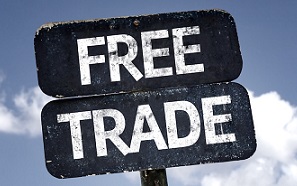 To participate in the game of Global Trade, we must be competent in some contributory role; we cannot only consume, we must add some value. This has been the consistent theme of the Go Lean book.
To participate in the game of Global Trade, we must be competent in some contributory role; we cannot only consume, we must add some value. This has been the consistent theme of the Go Lean book.
The book explained that the proper management of trade can increase wealth. This is related among the introductory Economic Principles, as follows (Page 21):
Voluntary Trade Creates Wealth: People specialize in the production of certain goods and services because they expect to gain from it. People trade what they produce with other people when they think they can gain something from the exchange. Some benefits of voluntary trade include higher standards of living and broader choices of goods and services.
If we want Non-Zero-Sum, a win-win, we must do our part to deliver some value-add to the trade dynamic. How do we go about in improving our trade prospects? The Go Lean book presents a detailed roadmap. It asserts that there are a series of community ethos, strategies, tactics, implementations and advocacies to better “Foster Trade” in the Caribbean region, among ourselves and the rest of the world. Consider this advocacy (headlines, summaries and excerpts) from the book’s Page 119, entitled:
10 Ways to Benefit from Globalization
| 1 | Lean-in for the Single Market treaty for the Caribbean Union Trade Federation (CU)
The CU will allow for the unification of the region into one market, thereby creating a single economy of 30 member-states, 42 million people and a GDP of over $800 Billion. The CU will deploy and then empower the economic engines within the borders of the member-states and also petition the United Nations for a declaration of an Exclusive Economic Zone (EEZ) for the Caribbean Seas. The intra-island engines will include Free Trade Zones, Industrial Parks, Urban Enterprise Zones and other Self Governing Entities. The goal of these installations is to increase economic activity, more jobs from GDP growth and direct foreign investments. |
| 2 | Declare Interdependence
The region, as a whole, can compete with and exploit the benefits of globalization, but the CU member-states need to openly acknowledge that they are interdependent in providing offense and defense in this war for “global trade”. Many of the regions’ challenges are too big for just one nation-state alone, but rather leveraging the population of 42 million in 30 member-states provides more economies-of-scale and more shock absorption for the CU investments. |
| 3 | Join The Club – World Trade Organization (WTO) |
| 4 | Compare and Analyze Opportunity Costs |
| 5 | Act Locally, Think Globally
The region has the same needs as elsewhere for basic supplies like food. As such, the CU needs to produce more of its own foods, even if the opportunity cost is higher – the EU and US accomplish the same goal by granting subsidies to their domestic agricultural sector. The CU will do the same but also include aqua-culture for fisheries stock control. |
| 6 | Level the Playing Field with Technology
The CU will level the playing field of global trade by fully deploying Internet & Communications Technology (ICT). The embrace of e-Delivery, e-Commerce and e-Payments systems allow firms and institutions in the Caribbean region an able-bodied chance of competing head-to-head with anyone in North America, Europe and Asia. |
| 7 | Foster Developments in Culture and Sports |
| 8 | Control the Message and Media |
| 9 | Help Regional Businesses Find Foreign Markets – Export
Since labor is cheaper in the CU region, compared to many foreign trading partners, this can present advantages (using the Theory of Comparative Advantage) for providing certain services and products like tele-services and light manufacturing. These prospects are further enhanced with the infrastructure the CU will facilitate for communications, energy systems, and transportation – where the Atlantic Turnpike can nullify transit issues. |
| 10 | Reform Tax and Revenue Systems |
The world is flat; this means that global trade proliferates. Some communities have already executed their roadmap for Non-Zero Sum Thinking. It is time we catch up in the Caribbean. See more here:
Title: The World Is Flat: A Brief History of the Twenty-first Century
This is an international best-selling book by[Economist] Thomas L. Friedman that analyzes globalization, primarily in the early 21st century. The title is a metaphor for viewing the world as a level playing field in terms of commerce, wherein all competitors, except for labor, have an equal opportunity. As the first edition cover illustration indicates, the title also alludes to the perceptual shift required for countries, companies, and individuals to remain competitive in a global market in which historical and geographic divisions are becoming increasingly irrelevant.
Friedman is a strong advocate of those changes, calling himself a “free-trader” and a “compassionate flatist”, and he criticizes societies that resist the changes. He emphasizes the inevitability of a rapid pace of change and the extent to which the emerging abilities of individuals and developing countries are creating many pressures on businesses and individuals in the United States; he has special advice for Americans and for the developing world. Friedman’s is a popular work based on much personal research, travel, conversation, and reflection. In his characteristic style, through personal anecdotes and opinions, he combines in The World Is Flat a conceptual analysis accessible to a broad public. The book was first released in 2005, was later released as an “updated and expanded” edition in 2006, and was yet again released with additional updates in 2007 as “further updated and expanded: Release 3.0”. The title was derived from a statement by Nandan Nilekani, former CEO of Infosys.[1] The World Is Flat won the inaugural Financial Times and Goldman Sachs Business Book of the Year Award in 2005.[2]
Source: Retrieved February 21, 2021 from: https://en.wikipedia.org/wiki/The_World_Is_Flat
Non-Zero Sum Thinking reflects the new Community Ethos that we in the Caribbean need to adopt. This means we have to look at the rest of the world as potential trading partners and new friends, not strangers or rivals. Can we pull this off?

Yes, we can …
The Go Lean book provides 370-pages of turn-by-turn instructions on “how” to adopt the new Community Ethos, plus the strategies, tactics, implementations and advocacies to accomplish this goal. In addition, we have published many previous blog-commentaries on the effort to foster more Global and Free Trade. See a sample list here:
| https://goleancaribbean.com/blog/?p=21138 | Brexit Manifestation: Bad Model for Trade |
| https://goleancaribbean.com/blog/?p=18834 | A Lesson in History: Free Trade Agreement of the Americas |
| https://goleancaribbean.com/blog/?p=16192 | In Defense of Trade: China Realities |
| https://goleancaribbean.com/blog/?p=16206 | In Defense of Trade – India’s Business Process Outsourcing |
| https://goleancaribbean.com/blog/?p=16208 | In Defense of Trade – Bilateral Tariffs: No one wins |
| https://goleancaribbean.com/blog/?p=12146 | Commerce of the Seas – Good Shipbuilding Model for Trade |
| https://goleancaribbean.com/blog/?p=12144 | Commerce of the Seas – ‘Sea Power’ Countries Have Advantages |
| https://goleancaribbean.com/blog/?p=8799 | Trade with China – Too Big to Ignore |
| https://goleancaribbean.com/blog/?p=7789 | Lessons from Detroit on Trade |
| https://goleancaribbean.com/blog/?p=6867 | How to address high consumer prices? Better Trade Deals |
| https://goleancaribbean.com/blog/?p=5597 | Economic Principle: Market Forces overrides Collective Bargaining |
| https://goleancaribbean.com/blog/?p=4767 | Welcoming World Trade Organization & Say Goodbye to Nationalism |
| https://goleancaribbean.com/blog/?p=4700 | Rare Earths: The new ‘Rush’ for Valuable Trade Assets |
| https://goleancaribbean.com/blog/?p=2887 | Caribbean States urged to work together to address rum subsidies |
| https://goleancaribbean.com/blog/?p=2435 | Latin America and Caribbean’s “Korea-like” dreams |
| https://goleancaribbean.com/blog/?p=994 | Bahamas rejects US demand for fairer Trade for American Imports |
“No man is an island; no island is an island”.
The “world is flat”; we have to complete with the rest of the world, yes. But we can also cooperate, collaborate and combine efforts with other parties sprawl throughout the wide world.
Let’s get busy …
… let’s get serious on this quest.
This is how we will make our Caribbean homeland a better place to live, work and play. We hereby urge all Caribbean stakeholders – producers and consumers alike – to lean-in to this comprehensive Go Lean roadmap to elevate Caribbean society. 🙂
About the Book
The book Go Lean…Caribbean serves as a roadmap for the introduction and implementation of the technocratic Caribbean Union Trade Federation (CU), for the elevation of Caribbean society – for all member-states. This CU/Go Lean roadmap has these 3 prime directives:
- Optimization of the economic engines in order to grow the regional economy to $800 Billion & create 2.2 million new jobs.
- Establishment of a security apparatus to ensure public safety and protect the resultant economic engines.
- Improve Caribbean governance to support these engines, including a separation-of-powers between the member-states and CU federal agencies.
The Go Lean book provides 370-pages of turn-by-turn instructions on “how” to adopt new community ethos, plus the strategies, tactics, implementations and advocacies to execute so as to reboot, reform and transform the societal engines of Caribbean society.
Download the free e-Book of Go Lean … Caribbean – now!
Who We Are
The movement behind the Go Lean book – a non-partisan, apolitical, religiously-neutral Community Development Foundation chartered for the purpose of empowering and re-booting economic engines – stresses that reforming and transforming the Caribbean societal engines must be a regional pursuit. This was an early motivation for the roadmap, as pronounced in the opening Declaration of Interdependence (Pages 12 – 13):
xi. Whereas all men are entitled to the benefits of good governance in a free society, “new guards” must be enacted to dissuade the emergence of incompetence, corruption, nepotism and cronyism at the peril of the people’s best interest. The Federation must guarantee the executions of a social contract between government and the governed.
xvi. Whereas security of our homeland is inextricably linked to prosperity of the homeland, the economic and security interest of the region needs to be aligned under the same governance. Since economic crimes … can imperil the functioning of the wheels of commerce for all the citizenry, the accedence of this Federation must equip the security apparatus with the tools and techniques for predictive and proactive interdictions.
xxiv. Whereas a free market economy can be induced and spurred for continuous progress, the Federation must install the controls to better manage aspects of the economy: jobs, inflation, savings rate, investments and other economic principles. Thereby attracting direct foreign investment because of the stability and vibrancy of our economy.
Sign the petition to lean-in for this roadmap for the Caribbean Union Trade Federation.

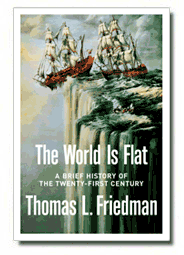
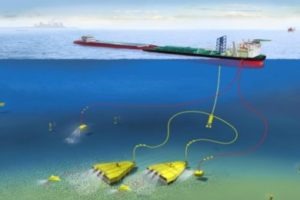





 Brexit is hereby ratified as of today; the new “rules of the road” go into effect tomorrow – January 1, 2021. (Brexit = British Exit from the European Union).
Brexit is hereby ratified as of today; the new “rules of the road” go into effect tomorrow – January 1, 2021. (Brexit = British Exit from the European Union).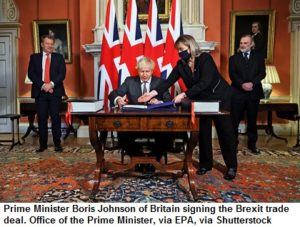
 Despite how much advances we have made in the millennia since King Hammurabi of Babylon reigned, this concept seems to be void in so many societies; this concept …
Despite how much advances we have made in the millennia since King Hammurabi of Babylon reigned, this concept seems to be void in so many societies; this concept … In addition, the issue of disunity remains; the Brexit vote showed that some elements in the United Kingdom are not so “united”. Just two years earlier, a referendum in Scotland to secede from the United Kingdom – and join the EU as a full member including the Eurozone Monetary Union – was narrowly defeated. There may still be a
In addition, the issue of disunity remains; the Brexit vote showed that some elements in the United Kingdom are not so “united”. Just two years earlier, a referendum in Scotland to secede from the United Kingdom – and join the EU as a full member including the Eurozone Monetary Union – was narrowly defeated. There may still be a  The Coronavirus COVID-19 pandemic has taught the Caribbean the important lesson that we are not prepared for the threats that come from one aspect of Globalization, the free and frequent movement of people across borders and continents. This pandemic started as a flare-up of a contagious respiratory disease in Wuhan, China; then in short order, the infections traversed the planet: to Europe and North America, then onto our Caribbean communities. We were not prepared and suffered accordingly, both medically and economically.
The Coronavirus COVID-19 pandemic has taught the Caribbean the important lesson that we are not prepared for the threats that come from one aspect of Globalization, the free and frequent movement of people across borders and continents. This pandemic started as a flare-up of a contagious respiratory disease in Wuhan, China; then in short order, the infections traversed the planet: to Europe and North America, then onto our Caribbean communities. We were not prepared and suffered accordingly, both medically and economically. The events related to UK, EU and Brexit are important for us in the Caribbean to consider … and learn from. In fact, we are in competition with the European world in terms of trade,
The events related to UK, EU and Brexit are important for us in the Caribbean to consider … and learn from. In fact, we are in competition with the European world in terms of trade,  What is the weather right now in Amsterdam, London, Paris and/or Washington DC?
What is the weather right now in Amsterdam, London, Paris and/or Washington DC?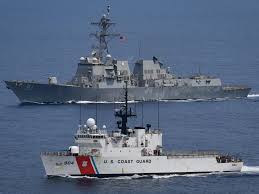
 “They never told us it was dangerous,” Ambroise Bertin says. “So people were working, because they wanted the money. We didn’t have any instructions about what was, and wasn’t, good. That’s why a lot of people are poisoned.” He’s talking about chlordecone, a chemical in the form of a white powder that plantation workers were told to put under banana trees, to protect them from insects.
“They never told us it was dangerous,” Ambroise Bertin says. “So people were working, because they wanted the money. We didn’t have any instructions about what was, and wasn’t, good. That’s why a lot of people are poisoned.” He’s talking about chlordecone, a chemical in the form of a white powder that plantation workers were told to put under banana trees, to protect them from insects.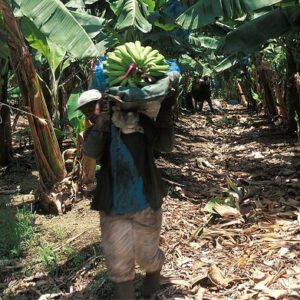 “They used to tell us: don’t eat or drink anything while you’re putting it down,” Ambroise, now 70, remembers. But that’s the only clue he and other workers in Martinique’s banana plantations in the 1970s, 80s and early 90s had about the possible danger. Few if any were told to wear gloves or masks. Now, many have suffered cancer and other illnesses.
“They used to tell us: don’t eat or drink anything while you’re putting it down,” Ambroise, now 70, remembers. But that’s the only clue he and other workers in Martinique’s banana plantations in the 1970s, 80s and early 90s had about the possible danger. Few if any were told to wear gloves or masks. Now, many have suffered cancer and other illnesses.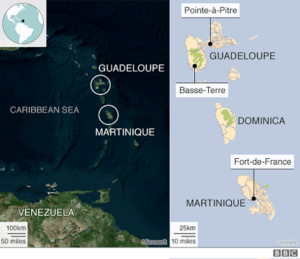
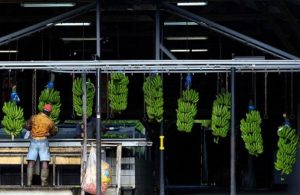 “Those are still the same group of people who have uncontested domination of the land,” says Guilaine Sabine, activist in a grassroots organisation called Zero Chlordecone Zero Poison. As well as campaigning for free blood tests for everyone on the island, members of the group have taken part in a new wave of protests over the last year aiming to draw attention to businesses that activists say have profited from the production and use of toxic pesticides. The demonstrations have been small, and some protesters have been convicted of violence against the police. But they reflect wider anger over the slow pace of France’s response to the chlordecone catastrophe.
“Those are still the same group of people who have uncontested domination of the land,” says Guilaine Sabine, activist in a grassroots organisation called Zero Chlordecone Zero Poison. As well as campaigning for free blood tests for everyone on the island, members of the group have taken part in a new wave of protests over the last year aiming to draw attention to businesses that activists say have profited from the production and use of toxic pesticides. The demonstrations have been small, and some protesters have been convicted of violence against the police. But they reflect wider anger over the slow pace of France’s response to the chlordecone catastrophe.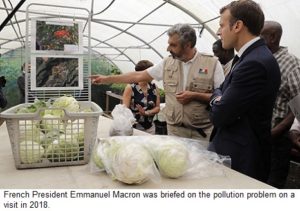

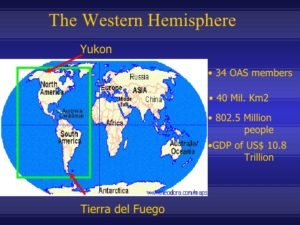 Free Trade agreements are highly controversial:
Free Trade agreements are highly controversial:
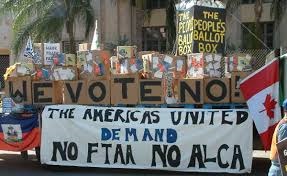 So when the ascension of the Free Trade Agreement of the Americas (FTAA) stalled in 2005 – see the historicity of FTAA in Appendix A below – this outcome taught an important lesson about something even more important than “Free Trade”:
So when the ascension of the Free Trade Agreement of the Americas (FTAA) stalled in 2005 – see the historicity of FTAA in Appendix A below – this outcome taught an important lesson about something even more important than “Free Trade”: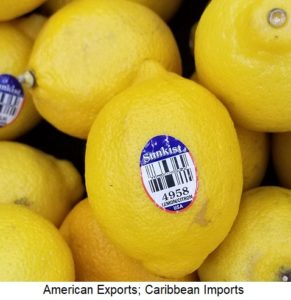
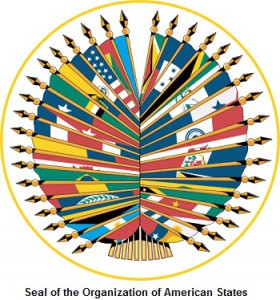 History In the latest round of negotiations, trade ministers from 34 countries met in
History In the latest round of negotiations, trade ministers from 34 countries met in 
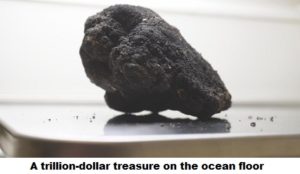
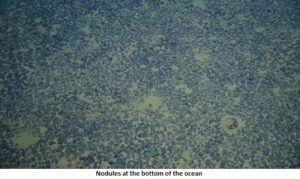
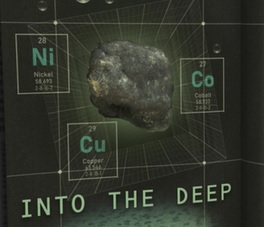


 Be our guest
Be our guest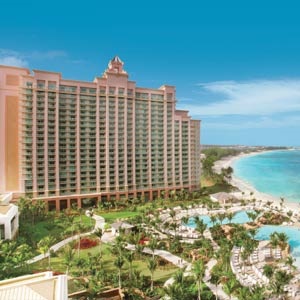 Now the primary economic driver in the region – every member-state – is tourism. We are still in the Life of Leisure business. Except now, instead of a Life of Leisure it is now only a week of leisure, or a forth-night, or a month, or a season (i.e. Winter Snowbirds). We have replaced one master for multiple masters at the resort properties; “one master at a time” still enjoys the leisure.
Now the primary economic driver in the region – every member-state – is tourism. We are still in the Life of Leisure business. Except now, instead of a Life of Leisure it is now only a week of leisure, or a forth-night, or a month, or a season (i.e. Winter Snowbirds). We have replaced one master for multiple masters at the resort properties; “one master at a time” still enjoys the leisure. … assigning the term “Dragon” to a “Dependence on Foreign Investors” or DFI. …
… assigning the term “Dragon” to a “Dependence on Foreign Investors” or DFI. …
 Now the focus must be on the changes that we need to move forward – the
Now the focus must be on the changes that we need to move forward – the 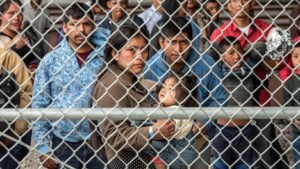
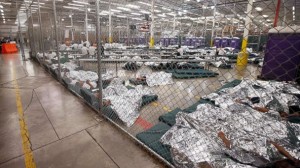
 But now reference is being made to a previous campaign in 1992 when there was a viable 3rd Party Candidate: H. Ross Perot. He garnered 18.9 percent of all votes for the presidency that year; (but he captured no electoral votes).
But now reference is being made to a previous campaign in 1992 when there was a viable 3rd Party Candidate: H. Ross Perot. He garnered 18.9 percent of all votes for the presidency that year; (but he captured no electoral votes).
 The contrast between the quietude of Perot’s last aging years and the blaring trumpets of his 20th-century business and political career is so stark it takes some effort now to recall how large this cocksure Texas bantam once loomed.
The contrast between the quietude of Perot’s last aging years and the blaring trumpets of his 20th-century business and political career is so stark it takes some effort now to recall how large this cocksure Texas bantam once loomed.

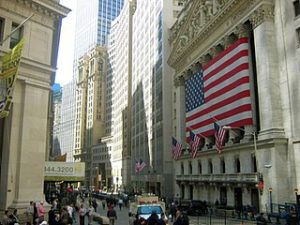 Trade giveth; trade taketh away …
Trade giveth; trade taketh away …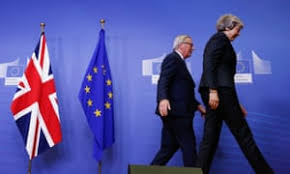
 So Wall Street experts like Ray Dalio are urging caution for national governments implementing trade tariffs. In fact, an editorial by the iconic Wall Street Journal is strongly urging the trump administration to tread lightly with their new found affinity for tariff. The reason is simple:
So Wall Street experts like Ray Dalio are urging caution for national governments implementing trade tariffs. In fact, an editorial by the iconic Wall Street Journal is strongly urging the trump administration to tread lightly with their new found affinity for tariff. The reason is simple:
 But Mr. Trump also continues to rail against China for its large bilateral trade surplus with the U.S., and this is clearly motivating his escalation of tariffs. The surplus is driven largely by Chinese comparative advantage in low-end manufacturing and global capital flows to the U.S. Prioritizing a goal that flies in the face of market forces sends a mixed message to Beijing on what the U.S. wants, and it allows China to pose as the defender of free trade.
But Mr. Trump also continues to rail against China for its large bilateral trade surplus with the U.S., and this is clearly motivating his escalation of tariffs. The surplus is driven largely by Chinese comparative advantage in low-end manufacturing and global capital flows to the U.S. Prioritizing a goal that flies in the face of market forces sends a mixed message to Beijing on what the U.S. wants, and it allows China to pose as the defender of free trade.